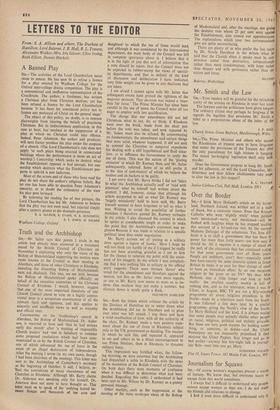SIR,—Both the letters which criticise the article by the Duchess
of Hamilton try to water down what the Archbishop did say in Aberdeen and to gloss over what was left unsaid. I was there and have a vivid recollection of how, with all the authority of the chair, Dr. Ramsey made a very positive state- ment about the use of force in Rhodesia subject only to the UK government so deciding. The manner in which he said this, and repeated it, appeared to me and others to be a direct encouragement to our Prime Minister, then in Rhodesia, to threaten military force.
This impression was fortified when, the follow- ing morning, we were informed that the Archbishop had dispatched a cable to Rhodesia with the news of his resolution of the British Council of Churches. On both days there were moments of confusion when it was difficult to determine what had been decided. Regarding this cable, I understood it had been sent to Mr. Wilson by Dr. Ramsey as a purely personal message.
Other matters, such as the suppression at the meeting of the more moderate views of the Bishop
of Mashonaland and, after the meetings, not givinf the decisive vote where 25 per cent were against the Establishment, also roused our apprehensions. The explanations which your two correspondents give are quite unconvincing.
There are plenty of us who prefer the line taken by Dr. Nevile Davidson in the debate when be said that the Church when it speaks must be con- structive rather than destructive, compassionate rather than mere condemnation, with hope rather than despair and with persuasion rather than co- ercion and force.


















































 Previous page
Previous page